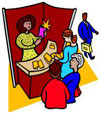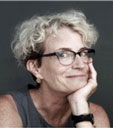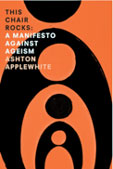| |
|
|

|
|
ATLAS |
|
|
Assistive
Technology
Laboratory
at
Stanford |
|
|
|
Technology
and design benefitting individuals with disabilities and older adults in the
local community |
January 25, 2017 |
|
|
|
|

Perspectives is the newsletter of the
Stanford course,
Perspectives in Assistive
Technology.
This issue invites you
to the next class session,
encourages your participation in the course's
Assistive Technology Faire,
solicits project suggestions for Mobility and
Older Adults, and announces a Book
Talk.
|
Perspectives in Assistive Technology is a Winter
Quarter Stanford course - now starting its eleventh year - that explores
the design, development, and use of assistive technology that benefits people
with disabilities and older adults. It consists of semi-weekly classroom
discussions; lectures by notable professionals, clinicians, and
assistive technology users; tours of local medical, clinical, and
engineering facilities; student project presentations and demonstrations; an
assistive technology faire; and a film screening. |
Next class
session - Thursday, January 26th at 4:30pm:
|

|
Designing Beyond the Norm to
Meet the Needs of All People
Peter W.
Axelson, MSME, ATP, RET
Beneficial
Designs, Inc. |
Abstract: Peter will talk about the difference
between Universal, Adaptable, and Adaptive design. Peter was the first
undergraduate using a wheelchair for mobility to live on the Stanford campus in
1976 when accessibility issues were just beginning to be addressed. Those
experiences and the desire to participate in the same physical activities as
every other college student who had professional and recreational interests
shaped his career as a designer. Peter will share how his interests spawned the
creation of Beneficial Designs, Inc to support the development of personal,
activity specific and environmental technologies for people of all abilities.
His experience in obtaining Small Business Innovation Research (SBIR) Grants to
develop and functionally assess products, services and the designs of outdoor
environments, has provided many opportunities for he and his staff to change
the way people with impairments of all kinds are able to participate in all
aspects of life activity. His company works toward universal access through
research, design and education to enable persons of all abilities to
participate in the physical, intellectual and spiritual aspects of
life.
Biosketch: Peter Axelson is a
rehabilitation engineer who sustained a spinal cord injury in a 1975 climbing
accident while in the Air Force Academy. He continued his education at Stanford
University, where he began applying engineering and design principles to
overcome daily living hurdles faced by people with disabilities. In 1981 he
founded Beneficial Designs,
Inc., an engineering design firm dedicated to designing, developing, and
testing assistive technologies. His accomplishments include developing the
first chairlift-compatible mono-ski with a shock absorber, working to establish
wheelchair testing standards, developing seating systems for wheelchairs, and
creating a system to assess trails that will improve access to outdoor trails
for people of all abilities.
Biosketch: Peter is the founder and the Director
of Research and Development of Beneficial Designs and spends much of his time
traveling throughout the world attending meetings and presenting his work. He's
also a pilot and avid mono-skier.
|
Attend a lecture -
Guest lectures will be held on Tuesdays and
Thursdays from 4:30 to 5:50pm and are open to
the greater Stanford community. You are most welcome to sit in on any class
sessions that interest you. You need not be a Stanford student and there is no
required signup, enrollment, or charge. The class will meet in a large, tiered,
accessible classroom on campus in the Thornton Center, adjacent to the Terman
Fountain and near the Roble Gym, the same venue as last year. Here are the
parking options, maps, and directions to
the classroom. |
 |
|
|
Did you miss a lecture? - Course
lectures are posted on YouTube. To find the links, browse to the
Lecture Schedule webpage, scroll down and click
on the lecture of interest. Near the bottom of the page you will see the
Lecture Material section which has links to the slides, photos, weblinks, and
lecture video. |
 |
|
|
Participate in the Assistive Technology Faire -
This fifth annual course event will provide an opportunity for students
and community members to get an up-close look at a variety of assistive
technology devices and learn about available services. Users of assistive
technology products as well as small companies and agencies
serving individuals with disabilities and older adults are encouraged to bring
assistive technology devices and information to display, demonstrate, and
discuss. Please browse to the Call for Assistive
Technology Faire Participants webpage and contact me if you would like to
be a part of this event as a user or vendor of assistive technology products or
services. Everyone is welcome to attend the faire.
The
Faire starts at 4:30pm on Tuesday, February
14th just outside the classroom, Thornton 110.
Here
are Dave's photos from last year's
Faire. |
 |
|
|
Solicitation for Mobility Projects for Older
Adults
A
capstone course is the academically integrative experience of an
undergraduate educational program that gives students an opportunity to
demonstrate the knowledge and skills they have gained during their time in
college. This experience helps prepare them for their engineering
careers.
ME113
- Mechanical Engineering Design - is a capstone course for seniors in
Mechanical Engineering at Stanford. In this course, students pursue on
"real-world" engineering problems offered by a company or other organization
(project partner).
Starting from a description of project goals provided by the project
partner, a student team of four seniors will develop a design concept and
explore its practical feasibility by fabricating and testing a series of
increasingly refined working models. Each project will supervised by a faculty
member using information and advice supplied by the project partner.
The
course will be conducted in the 10-week Spring Quarter from April through
mid-June.
One of
the themes this academic year is Mobility for Older Adults with a focus
on automobiles and driving.
At
this time, the course is soliciting problems or challenges that could be
addressed by a team of students.
The
best suggestions will be those that represent real problems experienced by an
individual with a disability or older adult in the local community that affects
their ability to drive or otherwise access transportation. Other suggestions
that broadly affect one's ability to walk or move are also welcome.
Please
email me your suggestions describing the problem and important features of what
a solution should do, but not how to achieve them. Thank you for your
consideration. |


 |
|
Upcoming Local
Event
|
Ashton Applewhite - Book Talk: A Future without
Ageism
People
are happiest at the beginnings and the ends of their lives. The vast majority
of Americans over 65 live independently. The older people get, the less afraid
they are of dying. Why then are so many of us scared stiff at the prospect of
growing old? Underlying all the hand-wringing is ageism, the last socially
sanctioned prejudice. A movement against it is emerging with Ashton Applewhite
as its leader and her book, This
Chair Rocks: A Manifesto Against Ageism, as a catalyst.
The Institute for the Future is pleased to
invite you to join us as we listen to Ashton dispel myth after myth about late
life and propose an alternative: wake up, cheer up, and push back. She's as
funny as she is fierce, and she just might change the way you think about the
rest of your life. Join us as we explore the opportunities and challenges ahead
for a future without ageism. What would change - between our ears and in
society at large - if ageism were as unacceptable as any other form of
prejudice? What actions could be taken today to redefine late life over the
next decade?
Ashton
will be appearing at The Institute for the Future at 210 Hamilton Ave in
downtown Palo Alto on Tuesday morning (10:00 - 11:30am), February 14th
for the
book
talk. This is a free event, but space is limited.
If
you're interested in attending, you can register
here.
|

 |
|
Support the course -
Funding in any amount for the course and student projects is always welcomed.
Monetary gifts support approved project expenses, administrative costs,
honoraria for guest lecturers, and the end-of-term celebration. Refer to the
Team Project Support webpage for more
information.
Email questions, comments, or
suggestions - If you have general questions, comments, or
suggestions about the course, email
David L. Jaffe, MS, the instructor. Thank you again for your interest in
the course.
Dave
|

To unsubscribe from this newsletter, please email
Dave. |
|












